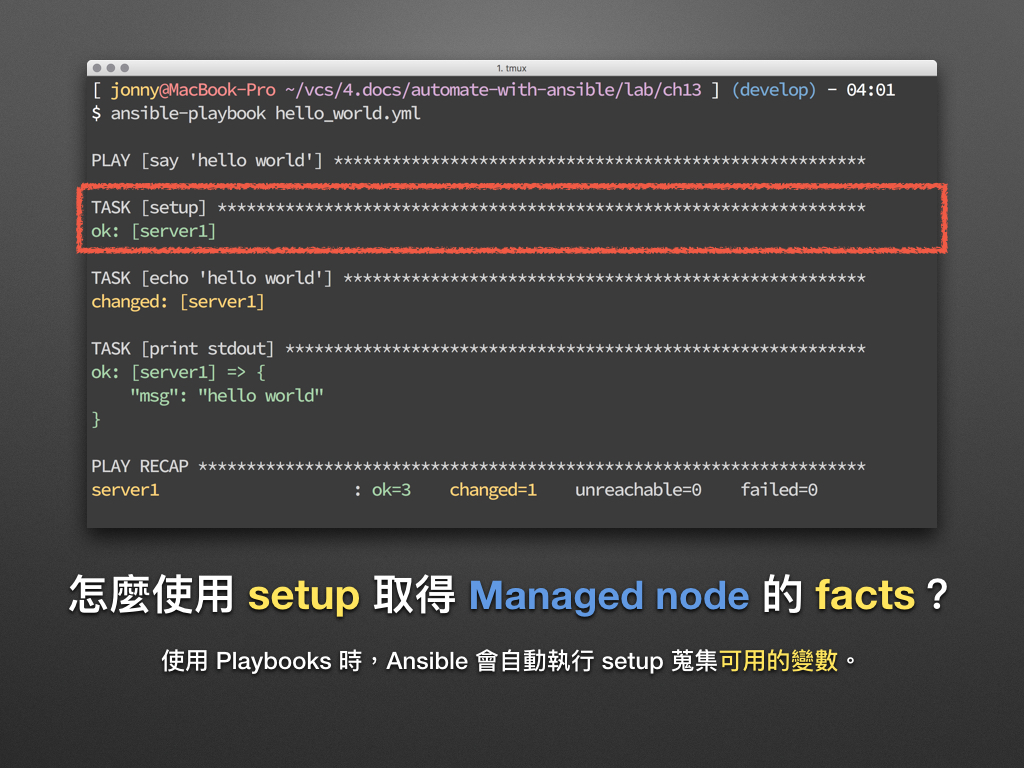
Ansible 使用 setup 取得 Managed node 的 facts
使用 Playbooks 时,Ansible 会自动执行 setup module 以收集各个 Managed node 的 facts。对冻仁而言这个 facts 就如同系统变数般的存在,从 IP 位址、作业系统、CPU 等资讯应有尽有。

官方文件介紹如下:
This module is automatically called by playbooks to gather useful variables about remote hosts that can be used in playbooks. It can also be executed directly by /usr/bin/ansible to check what variables are available to a host. Ansible provides many facts about the system, automatically.
Ad-Hoc Commands
冻仁一般会先使用 Ad-Hoc Commands 呼叫 setup 看看有哪些用的上的资讯,这对撰写些较复杂的 Playbooks 时是很有用的。
底下冻仁将使用 chusiang/ansible-managed-node:ubuntu-14.04 这个 Docker image 作为 Managed node。
借由 less 快速搜寻所有的变数。1
$ ansible all -m setup | less server1 | SUCCESS => { "ansible_facts": { "ansible_all_ipv4_addresses": [ "172.19.0.2" ], "ansible_all_ipv6_addresses": [ "fe80::42:acff:fe13:2" ], "ansible_architecture": "x86_64", "ansible_bios_date": "03/14/2014", "ansible_bios_version": "1.00", "ansible_cmdline": { "com.docker.database": "com.docker.driver.amd64-linux", "com.docker.driver": "com.docker.driver.amd64-linux,", "console": "ttyS0", "earlyprintk": "serial", "mobyplatform": "mac", "ntp": "gateway" }, "ansible_date_time": { "date": "2016-12-13", :搭配
filter将发行版本 (distribution) 的资讯给过滤出来。$ ansible all -m setup -a "filter=ansible_distribution*" server1 | SUCCESS => { "ansible_facts": { "ansible_distribution": "Ubuntu", "ansible_distribution_major_version": "14", "ansible_distribution_release": "trusty", "ansible_distribution_version": "14.04" }, "changed": false }取得套件管理员的种类资讯,此例取得的值为 apt。
$ ansible all -m setup -a "filter=ansible_pkg_mgr" server1 | SUCCESS => { "ansible_facts": { "ansible_pkg_mgr": "apt" }, "changed": false }
撰写跨 Linux distribution 的 Playbooks
取得 ansible_pkg_mgr 后,我们可以 Playbooks 里加个判断式使用。
建立支持 Debian, Ubuntu, CentOS 安装 Vim 的 playbook。
$ vim setup_vim.yml --- - name: Setup the vim hosts: all become: true tasks: # Debian, Ubuntu. - name: install apt packages apt: name=vim state=present when: ansible_pkg_mgr == "apt" # CentOS. - name: install yum packages yum: name=vim-minimal state=present when: ansible_pkg_mgr == "yum" # vim:ft=ansible :执行 playbook,且当条件不符时,即会跳过该 task。。
$ ansible-playbook setup_vim.yml PLAY [Setup the vim] ************************************************** TASK [setup] ********************************************************** ok: [server1] TASK [install apt packages] ******************************************* changed: [server1] TASK [install yum packages] ******************************************* skipping: [server1] PLAY RECAP ************************************************************ server1 : ok=2 changed=1 unreachable=0 failed=0
后话
setup module 是每位 Ansibler 一定会接触到的!我们可以善加利用它,并与各种需求搭配使用,这样会让 Playbooks 更具弹性且易于维护。
相关连结
1. 在 less 里我们可使用/+ 关键字 +Enter进行搜寻。 ↩